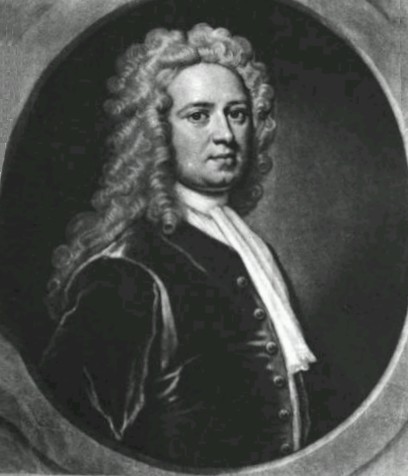- William Stukeley
Infobox Scientist
name = PAGENAME
box_width =
image_size =150px
caption = PAGENAME
birth_date =November 7 ,1687
birth_place =Holbeach ,Lincolnshire
death_date =March 3 ,1765
death_place =
residence = |citizenship =
nationality = English
ethnicity =
field =archaeology
work_institutions =
alma_mater =Corpus Christi College, Cambridge
doctoral_advisor =
doctoral_students =
known_for =Stonehenge Avebury
author_abbrev_bot =|author_abbrev_zoo =
influences =
influenced =
prizes =
religion = |footnotes = |The Rev. Dr William Stukeley FRS, FRCP, FSA (
November 7 ,1687 –March 3 ,1765 ) was an English antiquary who pioneered the archaeological investigation ofStonehenge andAvebury and was one of the founders of field archaeology. Stukeley also was one of the first biographers ofIsaac Newton .Life and work
William Stukeley was born the son of a
lawyer atHolbeach inLincolnshire on the site of Stukeley Hall, aprimary school that now bears his name. After taking his M.B. degree atCorpus Christi College, Cambridge , Stukeley went toLondon and studied medicine atSt Thomas' Hospital . In 1710, he started in practice inBoston, Lincolnshire , returning in 1717 to London. In the same year, he became a Fellow of theRoyal Society and, in 1718, joined in the establishment of the Society of Antiquaries, acting for nine years as its secretary. In 1719 Stukeley took his M.D. degree, and in 1720 became a Fellow of theRoyal College of Physicians , publishing in the same year his first contribution to antiquarian literature.Stukeley was one of the first learned gentlemen to be attracted to speculative
freemasonry , newly fashionable after the appointment of the first noble Grand Master. His Diary and Commonplace Book of June 6, 1721 says "I was made a Freemason at the Salutation Tav., Tavistock Street, with Mr. Collins, Capt. Rowe, who made the famous diving Engine." [cite book | author = Stukeley, William | title = The Commentarys, Diary, & Common-Place Book of William Stukeley & Selected Letters | year = 1980 | publisher = Doppler Press | location = London | pages = 54 ] The same entry says he was the first person for many years who had been so made in London; there was great difficulty in finding sufficient members to perform the Ceremony; and immediately thereafter "Freemasonry took a run and ran itself out of breath through the folly of its members."His diary and papers are among the earliest sources on the subject of the new Grand Lodge.
Stukeley's principal works, elaborate accounts of
Stonehenge andAvebury , appeared in 1740 and 1743. These were supposed to be the first of a multi-volumeuniversal history . Stukeley proposed that an ancient "patriarchial" religion was the original religion of mankind. This had subsequently degenerated as idol-worship had emerged. Stukeley believed that the Druids and the early Christians were examples of this religion. Stukeley himself was a Protestant. (Source: "Stonehenge, a Temple Restor'd", by Stukeley).Stukeley's work on Stonehenge was one of the first to attempt to date the monument. [cite book | author = Hawkins, Gerald S. | title = Stonehenge Decoded | year = 1965 ] Working with the renowned astronomer
Edmund Halley , he proposed that the builders of Stonehenge knew about magnetism, and had aligned the monument with magnetic north. Stukeley used some incomplete data about the variation of the North Magnetic Pole; he extrapolated that it oscillated in a regular pattern. Today it is known that the North Magnetic Pole wanders in an irregular fashion. However, Stukeley inferred that Stonehenge was completed in 460 B.C., which as we now know is several thousand years too late.He wrote copiously on other supposed Druid remains, becoming familiarly known as the "Arch-Druid." In 1729 he took holy orders, and, went on to hold two livings in Lincolnshire, including that of the parish of All Saints,
Stamford, Lincolnshire , where he did a considerable amount of further research, not least on the town's lostEleanor Cross . He was subsequently appointed rector of a parish inBloomsbury , London. He died in London on 3 March 1765.In 1742 he visited the
Royston Cave atRoyston, Hertfordshire and a year later he published his "Palaeographia Britannica or discourses on Antiquities in Britain no.I, Origines Roystonianae, or an account of the Oratory of lady Roisia, Foundress of Royston discovered in Royston in August 1742". Following a response by the ReverendCharles Parkin he penned the sequel: "Palaeographia Britannica or discourses on Antiquities in Britain no.II, or defense of Lady de Vere, Foundress of Roiston, against the Calumny of Mr. Parkin, rector of Oxburgh wherein his pretended answer is fully refuted: the former opinion further confirm'd and illustrated. To which are occasionally added, many curios matters in antiquity".Stukeley was a friend of
Isaac Newton and wrote a memoir of his life (1752).For many years a literary and historical body called the Brasenose Society flourished at
Stamford School (attended by his father and brother) which was named after the eponymous society founded by Stukeley while Vicar of All Saints, Stamford.A street in London's
Covent Garden district, near the intersection ofHigh Holborn andDrury Lane , is named after him.References
Further reading
* cite book | author = Burl, Aubrey | coauthors = Mortimer, Neil (eds) | title = Stukeley's Stonehenge: An Unpublished Manuscript 1721-1724 | year = 2005 | publisher = Yale University Press | location = | isbn = 0-300-09895-2
*- For details on Stukeley and Isaac Newton
*
*
*
*
External links
*
* [http://www.sacred-texts.com/neu/eng/str/index.htm Stonehenge, a Temple Restor'd to the British Druids, by William Stukeley]
* [http://www.avebury-web.co.uk/AburyWS/AburyWS.html Text and engravings of Stukeley's Avebury survey online]
* [http://www.britishmuseum.org/explore/highlights/highlight_objects/cm/b/bronze_medal_of_william_stukel.aspx Bronze Medal of William Stukeley at the British Museum]
Wikimedia Foundation. 2010.
